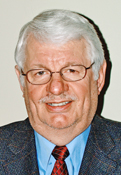Canadian Mennonite
Volume 13, No. 15
Jul. 27, 2009
Editorial
Unfinished business

Harry Lafond thinks Mennonites have a lot of “unfinished business” with aboriginals, issues from which we should not “walk away.”
As executive director of the Office of the Treaty Commissioner in Saskatchewan, he might be expected to say this to a Learning Tour group taking the time to travel to Duck Lake following Assembly in Saskatoon last month (see our main feature on page 4).
For some of us this declaration might bring a sigh of weariness, for others another prick of the conscience. We have been on this journey for quite some time now.
Sorry for taking the land from First Nations people for more than a century, we asked for their forgiveness in a “litany of confession” as early as the 1970 Winkler Assembly. “We have erred where we have poured our energies and anxieties into doing things instead of listening and learning, where principles, policies, programs and right theology took priority over you, the people,” our leaders humbly wrote among a long list of confessions.
That act of official contrition sustained us for another 36 years until a group of farmers, pastors and members of the Young Chippewayan First nation met at Stoney Knoll, Sask., to “exchange stories, play games and link hearts,” according to our own Canadian Mennonite account. That was in the fall of 2006.
A year later, our church leaders in the persons of Lois Coleman Neufeld and Robert J. Suderman joined the Anglican Church of Canada and the Evangelical Lutheran Church of Canada, along with other church bodies to sign a joint statement of recommitment to aboriginal justice. It was a Kairos moment, literally—an initiative guided by the organization Kairos on behalf of its church members.
Isn’t that enough? some of us might be asking quietly.
That’s precisely the point. We right-brain German/Russian/Swiss types have a different view of time, of work, of organization than do our First Nation counterparts. At times, and with the issues to which Lafond refers, our cultures couldn’t be more at variance.
We Mennonites, though mostly gentle in spirit, are hard-driving, impatient, task-oriented, organized to the tee, orderly, systematic, logical and persistent. We set up measurable goals and expect results. We are known more for our good deeds than for our many words. Just look at how cheerfully we volunteer for the many projects of Mennonite Disaster Service, the partnerships we form with nationals all over the world through Mennonite Central Committee.
So why can’t we bring some closure to our reconciliation with the aboriginals?
Could it be that, despite our best efforts, we still have trouble comprehending and accepting our cultural differences? To the aboriginal, time is the great teacher, not a commodity. Waiting for the “right time” is a virtue, not something to be anxious about. “Time is money” or “Time is of the essence” are not their slogans. Things of the spirit are far more important than machines, technology and conveniences.
Elders are respected and cared for, not warehoused in retirement communities and nursing homes. Their wisdom is a cultural treasure, highly valued by members of all ages in the community. In their oral society, elders’ well-chosen words of counsel and advice are taken seriously, not diminished because of the aging process.
The earth is the aboriginal’s “mother,” nurturer/provider/protectorate all tied up in one, not a patch of dirt that gives back higher and higher yields per hectare. And it is to be shared with others who depend on it for sustenance, not marked off with “No Trespassing” signs. To be in tune with nature is to be at peace with oneself, with the universe, with the Great Spirit. While we tend to compartmentalize our lives into manageable systems, they see life as a whole, as a “circle,” to use Lafond’s imagery.
So, despite our best efforts, our good intentions and contrite confessionals, this business of reconciliation, as Lafond puts it, is far from complete. It is only another milestone on the journey, a road on which “we are all learners in building bridges and relationships with our neighbours,” as Edith von Gunten puts it. She along with her husband, Neill, co-directs Mennonite Church Canada’s Native Ministry.
Through the persistent efforts of Lafond, cooperating with Mennonites and other church bodies, the wider society is coming to terms with the merging of these two cultures. Last year, Saskatchewan became the first province to implement mandatory treaty education in the public schools, an event that on September 15, 2008, coincided with the 134th anniversary of the signing of Treaty 4. Last month Manitoba followed suit. Ontario has it under advisement.